|
|
|
Sort Order |
|
|
|
Items / Page
|
|
|
|
|
|
|
| Srl | Item |
| 1 |
ID:
116618


|
|
|
|
|
| Publication |
2012.
|
| Summary/Abstract |
The Trans-Pacific Partnership (TPP) is a multilateral free trade agreement (FTA) which aims to liberalize the economies of the Asia-Pacific region. The rapid movement of the TPP agenda, however, has caused China some disquiet. Originally, the agreement was signed among four countries (Brunei, Chile, New Zealand and Singapore) on June 3, 2005, and entered into force on May 28, 2006. In 2008, five additional countries (Australia, Malaysia, Peru, the United States, and Vietnam) began negotiations to join the group.1 On November 12, 2011, the leaders of these nine TPP partner countries announced the broad outlines of an expanded TPP: it will promote innovation, enhance economic growth and development, and support the creation and retention of jobs among the nine dynamic Asia-Pacific economies.2 Further negotiations are still underway, with Japan, Canada, and Mexico also having demonstrated a strong interest in joining.
|
|
|
|
|
|
|
|
|
|
|
|
|
|
|
|
| 2 |
ID:
116620
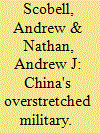

|
|
|
|
|
| Publication |
2012.
|
| Summary/Abstract |
Despite the dramatic growth of China's military power since the early 1990s, the Chinese People's Liberation Army (PLA), as all branches of China's armed forces are collectively known, remains overstretched as it seeks to address the wide range of missions it is called upon to perform. "China threat" theorists worry that the PLA poses a more significant challenge to the United States and China's neighbors than it did twenty years ago, and they are right. Yet the Chinese military is far from able to successfully carry out all its most pressing military tasks within China's borders and in its immediate neighborhood, and has only begun to project significant force beyond the Asia-Pacific.1 The real test for the PLA will be how adept it proves to be at bringing together new weapon systems, equipment, and formations in response to one or more serious instances of wartime or peacetime contingencies-a broad set of requirements the Chinese have dubbed "Diversified Military Tasks."2
|
|
|
|
|
|
|
|
|
|
|
|
|
|
|
|
| 3 |
ID:
116619
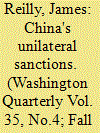

|
|
|
|
|
| Publication |
2012.
|
| Summary/Abstract |
China's opposition to economic sanctions is legendary. Beijing has repeatedly leveraged its permanent seat in the UN Security Council to criticize, ameliorate, and on rare occasions veto UN economic sanctions such as against Myanmar (2007), Zimbabwe (2008), and Syria (2011 and 2012). Unilateral sanctions by the United States come in for particular criticism. Chinese Foreign Ministry spokesperson Hong Lei recently said that "China is against one country putting their domestic laws above international law and placing unilateral sanctions on another country."1 This familiar rhetoric, however, masks a subtle but significant shift in China's own use of economic sanctions. With the world's largest capital surplus and its second largest economy, a highly coveted domestic market, and a currency with growing regional appeal, Chinese strategists are exploring new ways to deploy China's own economic might for strategic benefit.
|
|
|
|
|
|
|
|
|
|
|
|
|
|
|
|
| 4 |
ID:
116613
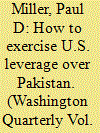

|
|
|
|
|
| Publication |
2012.
|
| Summary/Abstract |
The United States has more leverage over Pakistan than is widely appreciated, and it is time for American policymakers to use it. Since 2001, two successive administrations have tried to persuade Pakistan to end its support for militants-including the Afghan Taliban and the Haqqani network-exclusively through aid, diplomacy, and persuasion with few sanctions or conditions: an approach of all carrots and no sticks. They did so in the belief that Pakistan's fundamental problem was a lack of capacity, not will. They were wrong.
|
|
|
|
|
|
|
|
|
|
|
|
|
|
|
|
| 5 |
ID:
116614
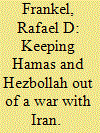

|
|
|
|
|
| Publication |
2012.
|
| Summary/Abstract |
The endgame in the decade-long global confrontation over Iran's nuclear program is arriving. If the Islamic Republic and the P5+1 (China, France, Russia, the United Kingdom, and United States as well as Germany) fail to achieve agreement soon after the U.S. elections in November 2012, a military confrontation between Iran and Israel, and conceivably the United States, may soon materialize. According to recent statements by Israeli Prime Minister Benjamin Netanyahu, if further talks do not produce concrete results by the spring of 2013, Jerusalem will face the decision of whether to exercise a military strike in order to stall the Iranians or to pivot to a containment strategy vis-à-vis Tehran.1 This will, in turn, force Washington to decide whether to approve a military option by Israel, prevent it, or attack Iran itself.
|
|
|
|
|
|
|
|
|
|
|
|
|
|
|
|
| 6 |
ID:
116617


|
|
|
|
|
| Publication |
2012.
|
| Summary/Abstract |
On July 1, 2012, Mexican voters elected their new president and Congressional representatives, returning the Partido Revolucionario Institucional (PRI) to power after a twelve-year hiatus. The country's new president, Enrique Peña Nieto, now faces a slew of challenges as he prepares for office (his term officially begins on December 1). These include sparking economic growth and creating jobs, addressing Mexico's stagnated legislative process, passing delayed structural reforms, and most importantly, making key decisions regarding the future of public security and the influence of organized crime. Many of these questions have immediate and far-reaching importance for the country's bilateral relations with the United States, and are being closely followed by policymakers and analysts on this side of the Rio Grande.
|
|
|
|
|
|
|
|
|
|
|
|
|
|
|
|
| 7 |
ID:
116612
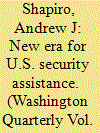

|
|
|
|
|
| Publication |
2012.
|
| Summary/Abstract |
As the United States transitions from a decade of war, it is clear that the task of maintaining global stability and addressing global challenges must be a shared responsibility. Working with allies and partners to address common security challenges has been a critical part of U.S. policy for decades. But the increased interconnectedness associated with global economic advances, while bringing prosperity to more countries and regions, has also meant that the security of the United States can be affected by events in more places, more countries, and more regions. This has led to an increased demand to expand our partnerships and deepen our security relationships. As Secretary Clinton noted recently, "building coalitions for common action is becoming both more complicated and more crucial."1
|
|
|
|
|
|
|
|
|
|
|
|
|
|
|
|
| 8 |
ID:
116615
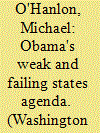

|
|
|
|
|
| Publication |
2012.
|
| Summary/Abstract |
Barack Obama has been a disciplined, pragmatic, and effective president on the urgent national security challenges of the day. His record is generally solid on matters such as managing the nation's major wars, pressuring rogue states, rebalancing the U.S. national security focus toward East Asia, and carrying out the reset policy with Russia. On balance, I would personally rate his foreign policy record through most of his first term as much better than average, with perhaps only George H.W. Bush having done clearly better at this stage among all presidents of the last half century.
|
|
|
|
|
|
|
|
|
|
|
|
|
|
|
|
| 9 |
ID:
116616


|
|
|
|
|
| Publication |
2012.
|
| Summary/Abstract |
Europe's Golden Age-an unprecedented period of peace, social stability, and prosperity that followed World War II-may be coming to an end. The very foundations of the European edifice have trembled at times in the last two years; even now, a worst-case scenario of collapse of the European project is not impossible. But if, as expected, Europe as we know it muddles through the Eurocrisis, it will not be the same. It will not be as happy and peaceful a place as before. In hindsight, the European settlement after World War II may not have constituted the beginning of a new European epoch, but a particularly auspicious chapter that is now closing. What remains to be seen is what might take its place. History is returning to Europe.
|
|
|
|
|
|
|
|
|
|
|
|
|
|
|
|
| 10 |
ID:
116611


|
|
|
|
|
| Publication |
2012.
|
| Summary/Abstract |
A moment has arrived when a great power with global responsibilities is having a crisis of confidence. Its economy has grown sluggish and it is being overtaken by a number of rising competitors. Financial pressures loom, notably the ability to keep a balance between government revenues and expenses. It is losing long-standing superiorities-psychological as well as technological and numerical-in key categories of military power; this great power, whose diplomats and military leaders manage active or potential conflicts from Afghanistan to Europe with treaty alliances as far flung as Japan and Australia, confronts the need for constraints on its global ambitions and posture. This urgent reckoning has been prompted in part by a painful and largely unnecessary counterinsurgency war far from home that cost many times more than initially thought and exhausted the country's overstretched land forces.
|
|
|
|
|
|
|
|
|
|
|
|
|
|
|
|
|
|
|
|
|